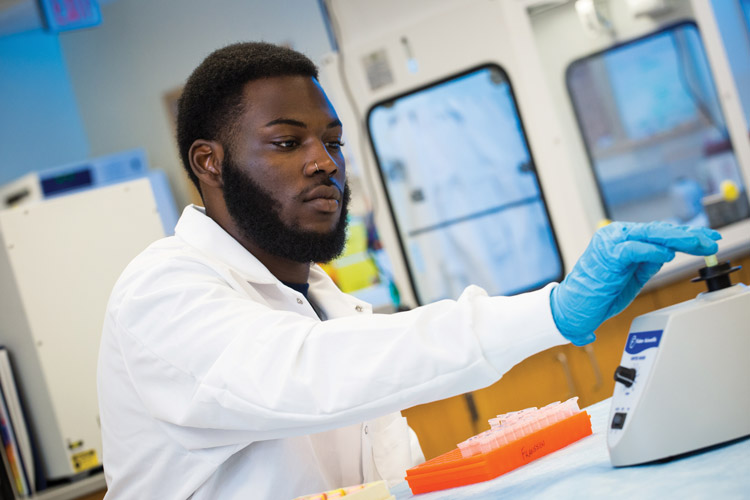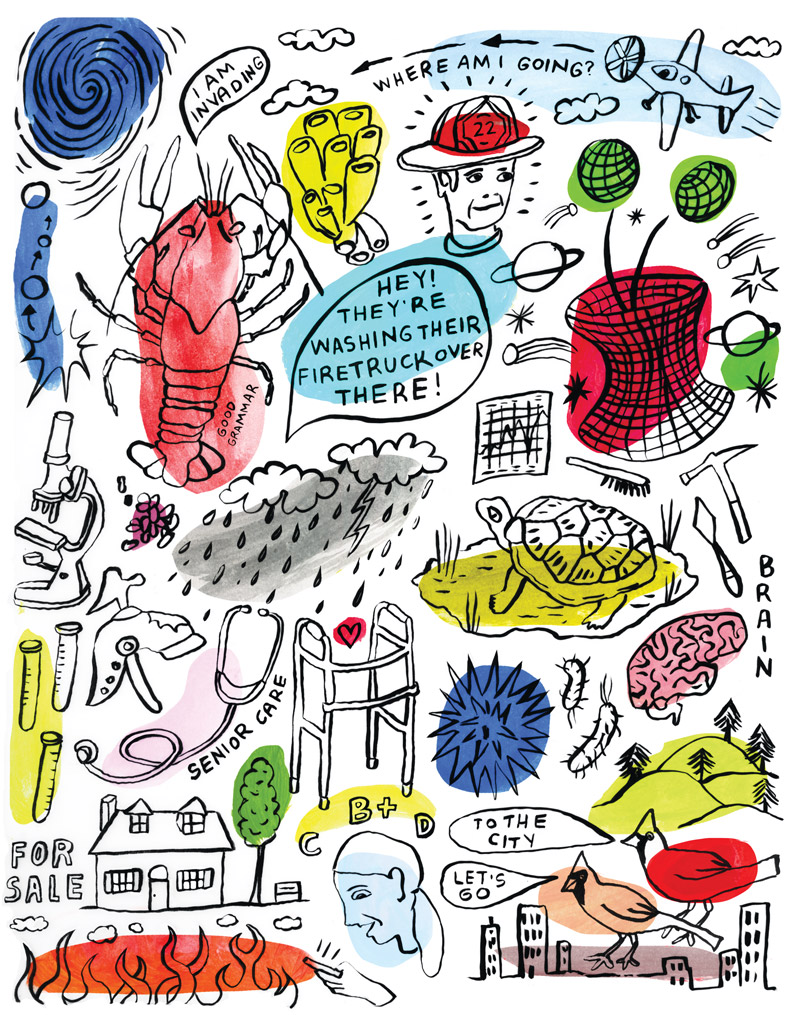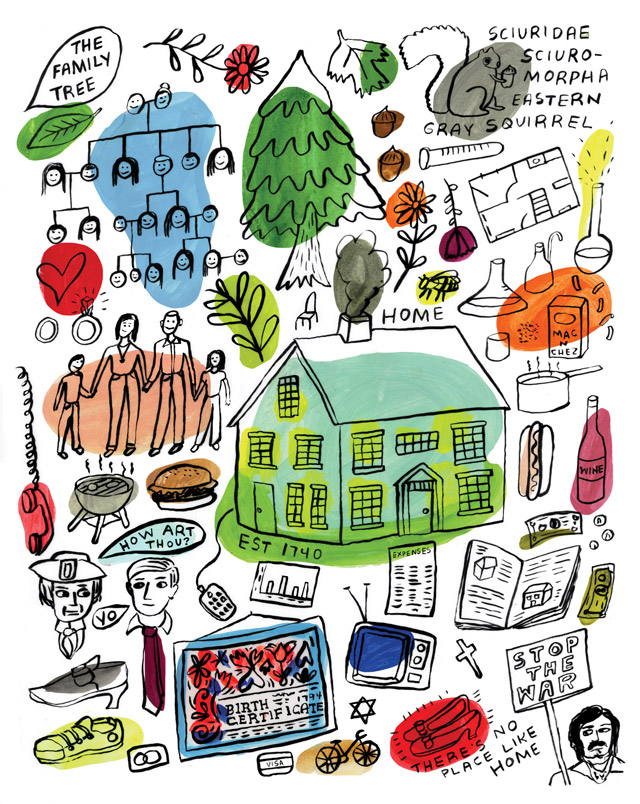Longwood commits to undergraduate research as an essential part of a transformative college education

Ri’Shawn Bassette ’17, a psychology and communication studies double-major from Hampton, is one of the many Longwood students whose academic experience has been enriched by Longwood’s commitment to infusing research throughout the undergraduate curriculum.Working with Dr. Catherine Franssen in the psychology department, Bassette researched alternative therapies in treating and preventing anxiety disorders as part of a 2015 PRISM project.
Late last fall, Gabby Cowardin and Marissa Jackson sat down with John Fulcher to talk fire departments. Fulcher, nearly 80, shared 40 years of stories about his volunteer brigade: members come and gone, the worst blazes he had fought, the most poignant moments of the last decades. Cowardin and Jackson listened. Occasionally they asked quiet questions, but mostly they sat in the Prospect Volunteer Fire Department garage, surrounded by fire trucks, and listened.
Then, as winter’s chill settled down in December, John Fulcher died, quietly and with little fanfare—much the same as he had lived his life. If not for the two Longwood students who had so recently spent time with Fulcher, his memories and institutional knowledge of the Prospect fire department would have been lost, along with whatever those decades of firefighting had unlocked inside him as a person.
Cowardin ’18, a kinesiology major from Rockville, and Jackson ’17, a biology major from Portsmouth, are part of a group of students who, over the course of several semesters and years, have recorded countless hours of interviews with volunteer firefighters from the region. In a project led by sociology professor Dr. JoEllen Pederson, the group has mined the interviews for data on what is, in many ways, a disappearing institution and avocation—the rural volunteer fire department. Their goal: understand the source of the camaraderie and sense of purpose that has kept these organizations vibrant even as their numbers have dwindled.
Around the country, education researchers are homing in on the transformational power of undergraduate research experiences to shape students and catapult them forward. The data are clear: Research nurtures curiosity, innovation and perseverance—essential skills for success in any graduate program or profession. Working closely with a faculty member makes students more likely to persist and graduate, and also transforms what they get out of college. A recent Gallup-Purdue University study of 30,000 American college graduates found those who worked closely with a professor in college were twice as likely to feel engaged in their work and three times as likely to thrive in general well-being.
The myth is that undergraduate research only works at giant research universities. In fact, the magic seems particularly powerful at places such as Longwood, where there are close ties between students and faculty, and where the highest proportion of classes is taught by full-time faculty of any Virginia public university.
Such focused learning opportunities require major commitments of time, energy and resources, but to Longwood’s eyes the payoff for students is immense. That’s why the university is making a big bet on scaling up research opportunities for undergraduates. Research is the cornerstone of the latest Quality Enhancement Plan, adopted last year as part of the accreditation process.
“The idea of working closely with a faculty mentor, pushing through obstacles to make your own distinctive contribution to a field, and in the process learning teamwork, communication and ethical responsibility—that’s Longwood in a nutshell,” said President W. Taylor Reveley IV. “The goal now is to make that a part of every Longwood student’s experience.”
As undergraduate research spreads to a wider range of disciplines, it takes a variety of shapes and forms. The common theme is human-scale learning. In many ways, Pederson’s project focusing on volunteer firefighters is quintessential— active learning under the close guidance of a faculty mentor that also features a deeply human connection. When John Fulcher died, the research became as much about service as about the pursuit of knowledge—a human face on an academic enterprise.
“Research experiences complement classroom instruction in a way that promotes deep thought and critical thinking,” said Dr. Crystal Anderson, director of the newly created Office of Student Research. “It’s important to note that we are not Virginia Tech—we aren’t trying to be. What we are investing in is a principle that’s always been at the heart of the Longwood mission: fostering inquisition, critical thought, engagement and active citizenship.”

Research conducted by undergraduates at Longwood covers a wide range of subjects, including the impact of invasive crayfish, traumatic brain injury, the urbanization of birds, differential geometry, attitudes about grammar, German colonial culture and policy, and many more. Some projects are undertaken as senior honors research; others are individual projects or are part of the summer PRISM program that provides a stipend and housing to student researchers. Illustration by Martha Rich.
English 150:The Common Thread
Personal experience is not separate from research,” said Dr. Chene Heady, associate professor of English. “Students often come in with limited ideas about research and what it entails, which is understandable. What we’ve done is personalize the philosophy and hone in on one very personal topic that students can explore in depth as soon as they step foot in a Longwood classroom.”
The mechanism for this exploration is English 150. Heady, a popular professor who specializes in 20th-century British literature, often teaches one or two sections each semester. The course is Longwood’s version of the ubiquitous freshman composition—the mention of which makes undergraduates from Poughkeepsie to Portland sigh. It’s a foundational class that sets the stage for deeper thought and functional, high-level writing. There are some professors who dread teaching the course as much as their students dread walking in the door, and then there are professors, Heady among them, who excel in imparting the tools of effective communication to freshman students.
In early discussions on expanding Longwood’s research footprint, English 150 was identified as a natural point for students to be exposed to the principles of deeper inquiry and critical thought. The overhaul was led by Dr. Heather Lettner-Rust, and the first course piloted by Heady.
“We all came in pretty green,” said Patrick Gobran ’18, a tennis player and business major from Edmonton, Alberta, who took Heady’s English 150 class last year and won the departmental award for best freshman essay of the year. “But by the end, we had all reached further than we expected. Three lessons in particular that I’ll take with me through my Longwood career: the importance of considering varied opinions and sources, how to gather information effectively and how to build an argument in an appropriate way.” Heady’s curriculum was built on the concept of home. It’s a dense concept—one ripe for unpacking. Heady explains: “To help students, I wanted to cast research in a way that they could understand and connect with in the actual world. We developed a series of research papers they had to write, each from a different academic perspective, but each centering on an aspect of the common theme of home.”
Each paper became a different way of understanding a student’s home. From a science perspective, students explored empirical data from their homes, such as Virginia Department of Education databases and published test scores. From a historical perspective, they researched library archives and old manuscripts. From an arts perspective, they studied the literature about and from the place.
“That introductory writing class is really quite critical to the long-term success of our efforts to enhance undergraduate research,” said Anderson. “It sets the stage by building skills needed not only to research a project they’ve been given but also to identify new questions. That’s really the job of a citizen leader: to know which questions to ask so you know what to solve.”
English 150 was identified in the QEP as a course into which research would be integrated over the next several years. The department is far ahead of schedule: In fall 2015, every section of the course had research at its core.
Room for Growth
A simple list of the benefits of undergraduate research make a powerful case for renewed emphasis on its place in the curriculum: Active learning that promotes curiosity. Teamwork. Higher grades. Interdisciplinary thought. Better information literacy. Increased retention. Greater expectations of graduate education. Relevant career preparation.
In major studies like the National Survey of Student Engagement, Longwood measures up well against many of its peers in categories such as student engagement and experience. In measurements of experiences with faculty-guided research, the university has an opportunity to make great strides. That means building on the foundation that was poured early in students’ freshman years.
“A great deal of my office’s work in the coming months and years is taking on the role of matchmaker,” said Anderson, who has already begun to put technology in place to facilitate the pairing of faculty research with student interest.
In on the Action
On Saturday, Sept. 12, Dr. Nate Saunders and 38 of his exercise science students stood in the lobby of the Health and Fitness Center, clipboards in hand. Exercise science and athletic training are two of the fastest growing programs at Longwood— career opportunities are growing and pay can be lucrative. But under the guidance of Saunders, an assistant professor of exercise science and member of the Undergraduate Research Advisory Board, the students are getting more than career preparation.
These aren’t your typical gym rats who only want to pump (clap) you up. The research they’re doing not only gives them valuable information they can take into job interviews but also is designed to have an impact on their own community—Longwood.
Each “activity mentor”—an exercise science student who is participating in the research and collecting data—is paired with a subject, either a Longwood student or employee. After a battery of questions and an explanation of the project, subject and researcher climb the stairs to the indoor track on the second floor of the Health and Fitness Center.
“You can do a one-mile walk or a mile-and-a-half run,” Andrew Law ’17, one of the activity mentors, tells his subject. “Your pace needs to be comfortable, but make sure you are working at it. Whenever you’re ready.” They take off on the run, which is punctuated with words of encouragement from Law at every lap. “Nice.” “Keep it up.”
For the next 10 weeks, Law, a kinesiology major from Midlothian, and the other activity mentors will monitor their subjects, collecting data on physical, intellectual and emotional wellness.
After 10 weeks, “we’ll have a data set that we can start digging into,” said Saunders. “The data will give us a slice of information about the Longwood community and perhaps reveal some problem areas we can work to address. For many of these students, this type of research is typical of what they’ll be doing in their careers. But I want them to see also that their work doesn’t exist in a vacuum: It’s got a direct application to the community in which they live.”
The same philosophy drives Pederson. “It’s clear, at least to me, what lasts,” she said. “When students take on research projects that are not only meaningful but applicable to their own lives, the projects become personal—they begin to matter. In a lot of cases, there’s a transformative aspect of the process: The student is not the same as he or she was before. There’s a deeper understanding and desire to seek answers.”
Pederson herself may be unique among Longwood faculty members. A junior member of the sociology department, she began integrating research into every one of her classes almost from the moment she stepped into her first Longwood classroom. She teaches four courses a semester while supervising and mentoring a handful of graduate students. All of the classes—without fail—have a research project at the core. Her Research Methods class is half of an effort, with Dr. Lee Bidwell’s class, to examine the test-optional admissions model—a research project that could have a significant impact on Longwood’s future. Her Aging and the Life class conducts research projects in groups, probing issues as varied as elder abuse and stereotypes of elderly people in film. That class is required of nursing students, giving them invaluable insight into the lives of their future patients. Her lower-level classes conduct the oral histories.
Across campus, opportunities for faculty-guided research at any stage of a student’s collegiate experience are cropping up more and more frequently.
The PRISM summer research program began three years ago with a focus on STEM (science, technology, engineering and math) disciplines. An exclusive, intensive eight week program, PRISM awards stipends to both students and professors to engage in meaningful research with the goal of publishing results. It’s a boon not only for the students but also for faculty members.
“Programs like PRISM are important first steps in the creation of a culture of inquisitiveness and critical thought,” said Anderson. “We plan, in the coming months and years, to invest time and resources in the expansion of current efforts while broadening our scope.”
Research efforts, however, aren’t limited to on-campus experiences. The James Jordan Archaeology Field School is currently in its 35th year of undergraduate archaeological exploration. The field school put students to work this summer excavating a 1,000-year-old Sappony Indian site and the original Henricus settlement in Chesterfield County. Field school graduates routinely go on to some of the best graduate schools in the world and land jobs and internships at nationally recognized organizations.
In addition, much thought has been given to the best use of Hull Springs Farm, 662 acres in Westmoreland County that were bequeathed to Longwood in 1999 and that lie along two tributaries of the nearby Potomac River. Living shoreline research has been ongoing for the last five years, and other projects are under way or being developed.
Not for the Faint of Heart
Alana Mackey ’16, a business major from Leesburg, never saw herself as a candidate for a senior honors research project, the capstone project that is undertaken by an exclusive group of students each year. That didn’t stop Dr. Frank Bacon, professor of finance, from recognizing her potential.
“She’s got it, but she doesn’t know it,” he said, matter-of-factly. The statement is typical of Bacon’s approach to selecting the students who work with him on the projects: If you’ve got what it takes, he won’t let you say no.
Bacon is one of the most stalwart champions of the most elite opportunity for student research on campus. Only a handful of research proposals are submitted to the senior honors research committee each year, and not all are accepted. Students who complete one of the massive projects are honored at commencement. Bacon has mentored at least one senior honors researcher a year since 2004. Mackey is his 14th student.
“I was a bit intimidated at the scope of the thing when Dr. Bacon approached me with the idea for it,” she said. I didn’t really see myself as someone who was ready for this type of challenge, but Dr. Bacon assured me that he’d be there to answer questions and help me get around any roadblocks I might encounter, and I took the plunge.”
Bacon has an unwavering belief in his students— a belief there’s plenty of evidence to show is well-founded. He has sent dozens to present at conferences across the country, and all have impressed their peers and other university professors alike. “I have always felt that if a student can successfully complete an academic research project, there is nothing that an employer could ever throw at them that they couldn’t do, or nothing they will encounter as an entrepreneur they can’t solve.”
A Clear Answer
As Longwood forges its path in the 21st century— in a landscape that in a few short years has seen the foundations of higher education challenged as never before— deep thought and reflection have gone into the value of a Longwood education. How best to facilitate the experiences that transform lives, both inside and outside the classroom? What will do students the most good in their lives and careers?
The answer that emerges time and again is undergraduate research: the powerful, essential opportunity that packs the punch to change perspectives and— done the Longwood way—underscores our fundamental mission as a university. Whether conducted a laboratory table, or along the shore of the Chesapeake Bay, undergraduate research is crucial to educating engaged citizen leaders, and that’s why developing opportunities and securing financial support for undergraduate research have become first-tier priorities for Longwood.
“The benefits are truly vast,” said Anderson from her desk in the Office of Student Research, “and we are really well-poised at Longwood to make great strides.”
—Matthew McWilliams

In early discussions on expanding Longwood’s research footprint, English150—Longwood’s version of freshman composition—was identified as a natural point for students to be exposed to the principles of deeper inquiry. The curriculum for the first course in the new model focused on examining the concept of home from a variety of perspectives, including science, history,
literature and the arts. Illustration by Martha Rich.
